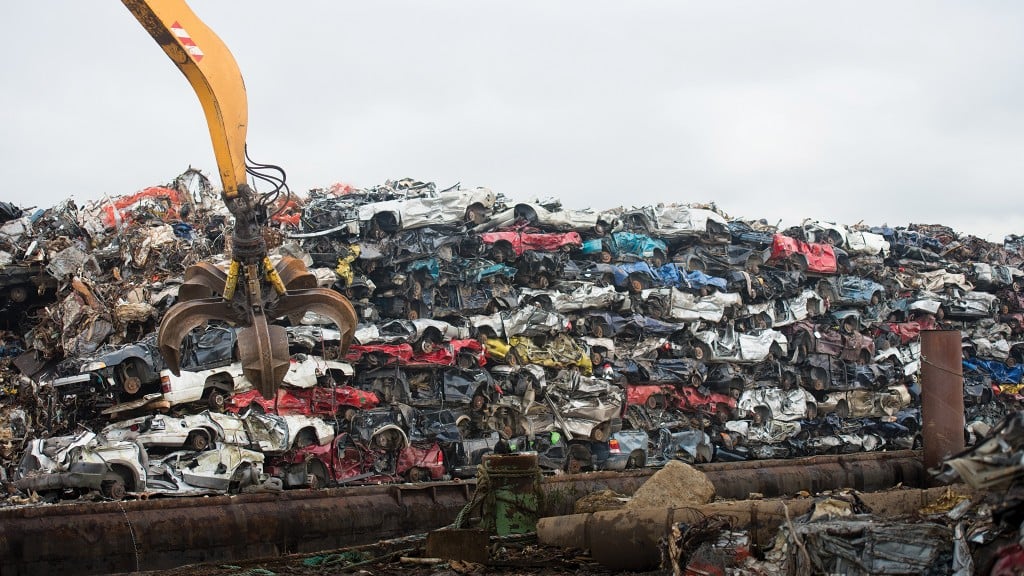Richmond Steel Recycling drives innovation and efficiency with B.C.'s only large-scale auto shredder
The company has adapted to market challenges and changing trends through innovation and a commitment to its employees and local communities

During the late sixties and early seventies, winds of change were blowing through the recycling industry. The environmental movement was gaining momentum, causing a significant shift as more people began to advocate for sustainable waste management practices.
Recognizing this growing need, British Columbia-based Richmond Steel Recycling adapted to the changing landscape of metal recycling by installing a shredder and making sustainability a cornerstone of its operations.
Car crushing and vehicle recycling
At the time, B.C. faced a shortage of options for recycling end-of-life vehicles, raising concerns about automotive waste ending up in landfills or scattered across auto wreckers' yards.
To address this issue, the government initiated the Scrap Auto Management (SAM) program, purchasing mobile car crushers to assist recyclers in crushing cars throughout the province.
Richmond Steel and its shredder played a crucial role in this initiative, providing a final destination for the materials and ensuring that scrap metal was free from other materials to maximize recycling efficiency. The government's efforts during Richmond Steel's formative years enabled widespread car crushing and facilitated efficient metal recycling through the company's facilities.
"Once the province was caught up with crushing the cars, Richmond Steel purchased those original crushers from the province, and we were still operating them when I started at Richmond Steel back in 1998," says John Rai, vice president of business development. "Obviously they'd been repaired and welded and rebuilt along the way, but they were in operation right up until about 2005."
The only large-scale auto shredder in British Columbia
Today, Richmond Steel runs as a joint venture between Sims Metal Management and Nucor Corporation, operating from five key locations strategically situated across Western Canada, including its B.C. yards in Fort St. John, Prince George, Kamloops, and Richmond, and a yard in Edmonton, Alberta.
With the province's only large-scale auto shredder residing in the company's main yard in Richmond, Richmond Steel has established a significant presence in the Canadian recycling industry.
Richmond Steel handles both ferrous and non-ferrous metal, household items such as cars and appliances, and heavy items like structural steel, beams, plates, and rebar. Expanding beyond traditional metal recycling, Richmond Steel has ventured into decommissioning and industrial demolition services, focusing on specialized projects such as mines, oil and gas pipelines, railroads, and sawmills.
Recycling these scrap metals not only preserves natural resources but also consumes significantly less energy than manufacturing new products from virgin raw materials, making it a more sustainable choice.
Ongoing education and continuous employee training
Central to Richmond Steel's success is not just its facilities, but also the continuous development of its employees. Maintaining a comprehensive set of standard operating procedures for all tasks is essential to ensure consistent training across locations.
"A standard operating procedure for a material handler in Edmonton would be the same as if you're operating that material handler in Richmond," says Rai. "We can pluck an employee from our Fort St. John Yard, for example, and parachute him into the Kamloops yard and he's good to go. There's site-specific training since every site is obviously a little bit different, but the training is pretty well standardized to our standard operating procedures."
Continuous education and consistent training have played a key role in safety at Richmond Steel. Rai notes that the company's safety standards often surpass government requirements, meeting or exceeding the standards set by both WorkSafeBC in British Columbia and the Workers' Compensation Board in Alberta, highlighting their proactive approach to ensuring a safe work environment.
Richmond Steel actively showcases its employees on its blog, recognizing their achievements, skills, and contributions. This practice not only celebrates individual and team successes but also plays a crucial role in employee retention.
By featuring employee stories and accomplishments, Richmond Steel fosters a culture of recognition which in turn enhances job satisfaction and motivation. This visibility encourages skill building and development, as employees see firsthand the value of their work and the opportunities for growth within the company.
Richmond Steel's training programs also ensure that employees are well-equipped to handle the complexities of metal recycling operations safely and efficiently. By fostering a culture of continuous learning, Richmond Steel has built a workforce capable of navigating the evolving industry landscape.
The effects of the pandemic on auto recycling
The impact of industry trends and external factors also underscores the importance of adaptable and well-trained teams. The pandemic in particular highlighted the need for agile training strategies to navigate disruptions and ensure business as usual.
"The pandemic has greatly affected the metals recycling industry, as it did all industries," says Rai. "We went through shortages of consumer items throughout the latter half of 2020 and throughout 2021, and into 2022 there was a shortage of microchips that affected all these consumer products, including automobiles that we shred."
Recyclers rely on people buying new vehicles to obtain the old ones as feedstock, which often includes valuable scrap steel. A shortage of new cars - as well as higher costs for them - emerged during the pandemic, causing many people to keep and repair their older vehicles far longer than usual.
According to Rai, it became common to see people investing in substantial repairs for older vehicles which would typically have been scrapped. However, as new car prices have started to taper off, Rai says this pattern may change.
"Typically, those kinds of vehicles come off the road because people won't put a transmission into a 2002 Honda Accord, for example. But during the pandemic, we saw that people would put that $3,000 repair on a 2002 Honda Accord because the rest of the car was fine, and that would extend the life of that 2002 Honda for another 10 years," says Rai. "That was partly because of the shortage of cars, and the price spike for a while. People also didn't know what was going to happen. It was a way of saving money because $3,000 put into a car is still cheaper than $40,000 for a new Accord to replace it."
Rai notes a similar trend with people holding onto their appliances and household goods longer, leading to a decrease in the volume of materials brought to the yard.
Over the years since the pandemic, Rai says that significant changes have also occurred in related industries that supply materials to the yard. Scrap metal recycling has become increasingly important in maintaining a steady supply of materials, helping to mitigate the impact of these disruptions.
"There's been other shifts as well that have happened in what I call ancillary industries or industries that feed our shredder. Auto wrecking, for example," says Rai. "There's been a shift in that. We see a lot more vehicles or parts from vehicles - engines, etc. - going in containers offshore. It's just been a different type of market since the pandemic for sure. I don't think we've returned to what the market was pre-pandemic."
A sustainable future for ferrous and non-ferrous metals
As a key player in British Columbia's recycling sector, Richmond Steel has adapted to market challenges and changing trends through innovation and a steadfast commitment to its employees.
By leveraging its strengths in training and innovation, the company has not only weathered the storm but emerged stronger. The lessons learned during the pandemic have reinforced the importance of agility, innovation, and a strong focus on employee development.
As the market gradually recovers, Richmond Steel's strategic initiatives and strong foundation will enable it to capitalize on new opportunities and navigate future challenges effectively. Through trends and challenges, its commitment to continuous learning, operational efficiency, and collaboration remains steadfast - a testament to its legacy and vision for a sustainable future.



